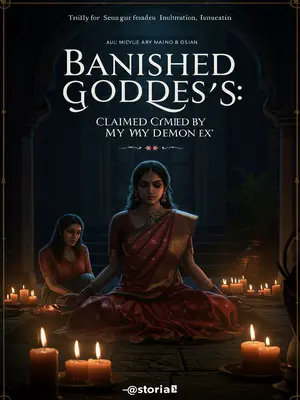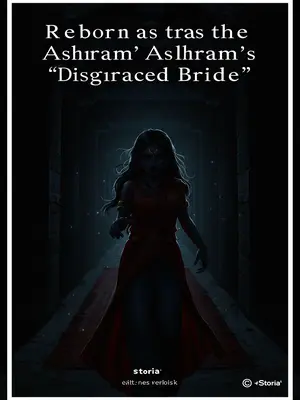Chapter 1: Sabhas, Samosas, and Serial Drama
In a fantasy romance serial, I actually saw a young female apsara confronting Indra Dev right in the Sabha Mandap of Swarglok.
As I watched from the cracked vinyl sofa in my parents’ drawing room, the aroma of fresh samosas and chai wafted from the kitchen. The ceiling fan above creaked in protest as I leaned forward, nearly spilling chai on the plastic tablecloth. The scene was so outrageous that my mother, halfway through chopping onions, paused and muttered, “Arey, nowadays these serials have gone mad!” The young apsara, draped in a shimmering peacock blue sari, stood before Indra Dev and all the assembled devas, demanding, "Aapko pyaar ka matlab bhi pata hai, Indra Dev?"
All the devas were left speechless.
Even the background score paused for dramatic effect, and you could almost hear the tension crackle through the Mandap, like that prickly silence before a storm in Delhi summers. My father, who usually never watched these shows, glanced over his newspaper and grunted, biting his tongue, “Logon ka bas chale toh Indra Dev ko bhi taang pe khada kar denge.”
I was so furious, I wanted to jump straight into the TV and become Indra Dev myself.
The ruler of the Three Worlds, and still I have to argue with you?
Naive, sweet female lead.
Brooding asura prince male lead.
Obsequious second male lead.
Bas, ab aur nahi! Get rid of them all. Wipe them out.
01
My name is Rohan Sharma.
I could hear the Sharma in my tone as I said my own name, as if every Rohan from our colony was summoned for this act. And just like that, I became Indra Dev.
Arre, yeh kya ho raha hai? I was completely thrown off. For a moment, I pinched myself, half-expecting to wake up on that cracked sofa with my mother scolding me for daydreaming.
Inside the Sabha Mandap, I found myself held hostage.
Held hostage by so-called moral righteousness.
A young female apsara glared at me as if I were some monstrous villain.
The man beside her was just a mortal—a scholar, judging by his kurta and jhola. Ten years of studying for UPSC and still hadn’t cleared the prelims, yet he had the nerve to flirt with an apsara. He cowered behind the young apsara, looking utterly pitiful, not a shred of dignity. Every now and then, he’d shoot me a defiant look, clearly convinced I wouldn’t dare touch them.
I had seen that look before—at tuitions, in the queue for local trains, from toppers who think just because they memorise a few shlokas, they can question even the gods. The jhola on his shoulder was faded, probably held together by safety pins and hope, much like his IAS dreams. He seemed one step away from reciting a poem in protest, as if slogans could save him here.
Inside me, I could sense another primordial spirit—the true Indra Dev. His presence radiated a faint divine aura, filled with the power of Dharma. Incredibly powerful. I had a feeling that if he truly lost his temper, he could destroy the world itself.
The air crackled with that uncanny charge—like the moment before the monsoon breaks over Mumbai, when even the crows go quiet. The Sabha Mandap’s marbled pillars shimmered with the weight of invisible energy, and the cloying scent of agarbatti mixed with the distant echo of temple bells. At the entrance, a rangoli of lotus and peacock feathers marked the threshold, vibrant and sacred. If Dadi had been here, she’d have peered over her glasses and muttered, “Beta, yeh toh bahut bade logon ki baat hai, door raho.”
But the problem was—why didn’t he get angry? They were practically shouting in his face, and he could just tolerate it? Really?
Indra Dev’s primordial spirit spoke first: "Such a vast Swarglok, if it’s not one apsara longing for the mortal world, it’s another falling in love—so much noise, my head is about to split. You take the throne for a few days, I’m going to rest."
I couldn’t help but ask, "Hey, you’re the ruler of the Three Worlds—don’t you have any temper at all?"
Indra Dev’s primordial spirit let out a deep sigh.
"I am Indra Dev. I must think of all beings in the Three Worlds. They are all my children—even that mortal. I cannot bear to harm them."
His tone was so sincere, nothing like Indra Dev as portrayed in serials or mythological tales. From him, I felt love—true, boundless love.
There was a kind of softness in his words, the same way my own father would scold me for not studying, but later come quietly to hand me a cup of hot milk. From this Indra Dev, it was not just authority—it was the old, weary affection of someone who has carried the burden of everyone’s happiness for ages. The weight of Dharma wasn’t just laws; it was love, laced with silent sacrifice.
How absurd that these apsaras who pine for the mortal world think Indra Dev doesn’t understand romantic love.
I said solemnly, "Then go rest. Leave this to me."
Indra Dev’s primordial spirit vanished into the void, leaving me alone.
Staring at the spot where he disappeared, I muttered, "Let me take all the blame. These fantasy romance serials must end."
The moment was almost comic—one minute you’re watching TV with a stale samosa, the next you’re sitting on the throne of Swarglok, deciding the fate of an apsara and a mortal. I adjusted my imaginary mukut, straightened my imaginary angavastram, and took a deep breath.
My consciousness returned to reality.
I fixed the young female apsara with a cold stare.
Apsaras are never plain, and she was beautiful indeed. Her thoughts were even more elaborate. She actually wanted to use moral pressure to force the Sabha Mandap to let her and her beloved go.
Her bangles jingled with nervous energy, and her kajal-lined eyes narrowed in determination. I could see the calculated innocence in her folded hands, the way she tilted her head just so, hoping the assembly would melt. In Indian families, daughters have used this look for centuries—sometimes it gets you out of trouble, sometimes it lands you in more. Here, she was staking her entire fate on it.
If I remembered correctly, her true form was a blade of grass in Lakshmi Mata’s garden. Lakshmi Mata discovered her budding spiritual spark and poured a kalash of thousand-year amrit on her, granting her human form. After that, Lakshmi Mata treated her well, teaching her the ways of Swarg and making her a court attendant.
But now, it seemed she wasn’t satisfied.
There was a whisper of betrayal in the Sabha Mandap, the kind that would set every aunty in the neighbourhood gossiping over the balcony. ‘She got everything from Lakshmi Mata, and still, she wants more?’ I could almost hear the murmurs—‘Naak kata di, beta, pure parivaar ki.’
I sighed softly.
Even a blade of grass dares to publicly challenge Indra Dev. Who writes these scripts?
The Sabha Mandap was heavy with the fragrance of sandalwood and marigold, but the mood had soured, like kheer gone bad in the heat. Somewhere, a conch shell was blown in another part of Swarg, as if the world itself was uneasy.
"Indra Dev, is it not too cruel to force two people who love each other to part?" the young apsara pressed on, her voice full of indignation.
My expression grew colder and colder. Suddenly, I asked, "Who are you?"
Everyone present was taken aback.
The young apsara was puzzled by my question, but replied, "I am Ananya, attendant to Lakshmi Mata."
As soon as the words left her mouth—
A sharp crack echoed through the mandap, like a chappal slapped against wet stone.
I raised my right hand and, with a wave from afar, sent her flying across the hall. She crashed heavily into a golden pillar dozens of feet away.
A single earring fell from her ear, rolling across the marble floor. The devas winced, some averting their eyes.
The devas gasped in shock, and even the rishis shifted uncomfortably, their beads stilled in their hands. No one in the Sabha Mandap had ever seen such open defiance punished so quickly, not since Narad Muni tried to sneak mangoes during the monsoon feast.
"Outrageous! So you do remember you’re just an attendant."
My voice was icy, laced with deadly intent.
An attendant, daring to question Indra Dev?
In the real world, this would be like a peon scolding the principal during morning assembly. The absolute audacity! I could see the gods and goddesses exchanging glances, the way teachers do when a student steps out of line. In our world, hierarchy is everything; there are places you simply do not speak out of turn.
All I can say is, just because it’s a serial for women doesn’t mean you can ignore the rules.
And in a fantasy romance serial, even less so.
Indra Dev is angry.
Inside and outside the Sabha Mandap, a wave of dread filled the air.
The marble floors shimmered; even the yakshas at the doorway shuffled nervously. Some unseen hand snuffed out the scented lamps. Outside, wild winds howled, rain poured, lightning split the sky—heaven and earth seemed plunged into chaos, as if pralaya had come.
Inside, all the devas and rishis trembled in terror, not daring to utter a word.
The rustling of silk and the clang of tridents had stopped. Everyone stared at me, wide-eyed, as the peacock feather on my crown glowed with the hint of a storm. Even the smallest apsaras at the back pressed their palms together, whispering silent mantras.
Suddenly, everyone remembered—the one sitting up there was Indra Dev. The ruler of the Three Worlds. With a single thought, he could obliterate heaven and earth.
The scholar, seeing this, collapsed to the floor in fright.
Ananya wiped the blood from the corner of her mouth, pointed at me, and said, her hands trembling, "Yes, I broke the heavenly rules. But I belong to Lakshmi Mata. She should discipline me. Even if you are Indra Dev, you can’t just ignore the rules!"
There was a courage in her words, but it trembled at the edges—like a student who knows the principal is angry, yet tries to quote the school handbook. I admired her spirit, but also wondered if she had any idea what lines she was crossing.
"Rules?"
I arched an eyebrow, as if I’d just heard a joke.
Serials really love their rules. As long as you find a loophole, you can use it to your advantage.
Lakshmi Mata is the leader of all female attendants. When an attendant breaks the rules, she’s supposed to be disciplined by Lakshmi Mata herself.
Ananya’s idea was simple: let Lakshmi Mata handle it. As long as she pleaded for mercy and won some sympathy, a major offence would be reduced to a minor one.
"I am the rules."
My voice thundered through the mandap, carrying supreme authority.
A beat of stunned silence followed. Somewhere, a rishi’s mala beads slipped from his fingers, and at the back, a yaksha fainted, crashing into a pile of flower baskets.
Indra Dev represents Dharma. In that sense, his will is the will of Dharma itself. Who dares question it?
The weight of my words pressed down on everyone, the way a grandmother’s silence can fill an entire house with dread. This wasn’t just about rules; it was about order, the fabric of the cosmos.
"You are the mighty Indra Dev—how can you be so unreasonable?" Ananya protested, still trying to argue, her voice breaking on the last word.
Her braid trembled as she spoke, and for a second, the stubbornness in her eyes reminded me of my younger sister when she would refuse to eat karela at dinner. But this was no home kitchen, and her defiance would not end with just a scolding.
"You want to reason? Fine, let’s reason."
I sneered, stretching out my hand. "I won’t bother settling your other debts. You only gained human form thanks to the thousand-year amrit. Return it to Swarglok."
"What?"
Ananya’s face turned deathly pale.
The amrit had long since merged with her. With her meagre shakti, losing its power would surely revert her to her original form.
The Sabha Mandap went silent—like the hush that falls when someone drops a plate at a wedding and everyone turns to look. The devas shifted uncomfortably, well aware of the consequences. Even the scholar’s face blanched, as if he’d just failed yet another mock test.
The scholar, realising he might lose her, summoned his courage and shouted, "Yeh aapko shobha deta hai, Maharaj? You care about a single kalash of amrit?"
I laughed softly, and stood up.
A ripple of energy spread through the air, the kind that made even the bravest rishis clutch their rudraksha beads tighter. My laughter was cold, cutting through the Sabha like the first winter breeze in Shimla.













